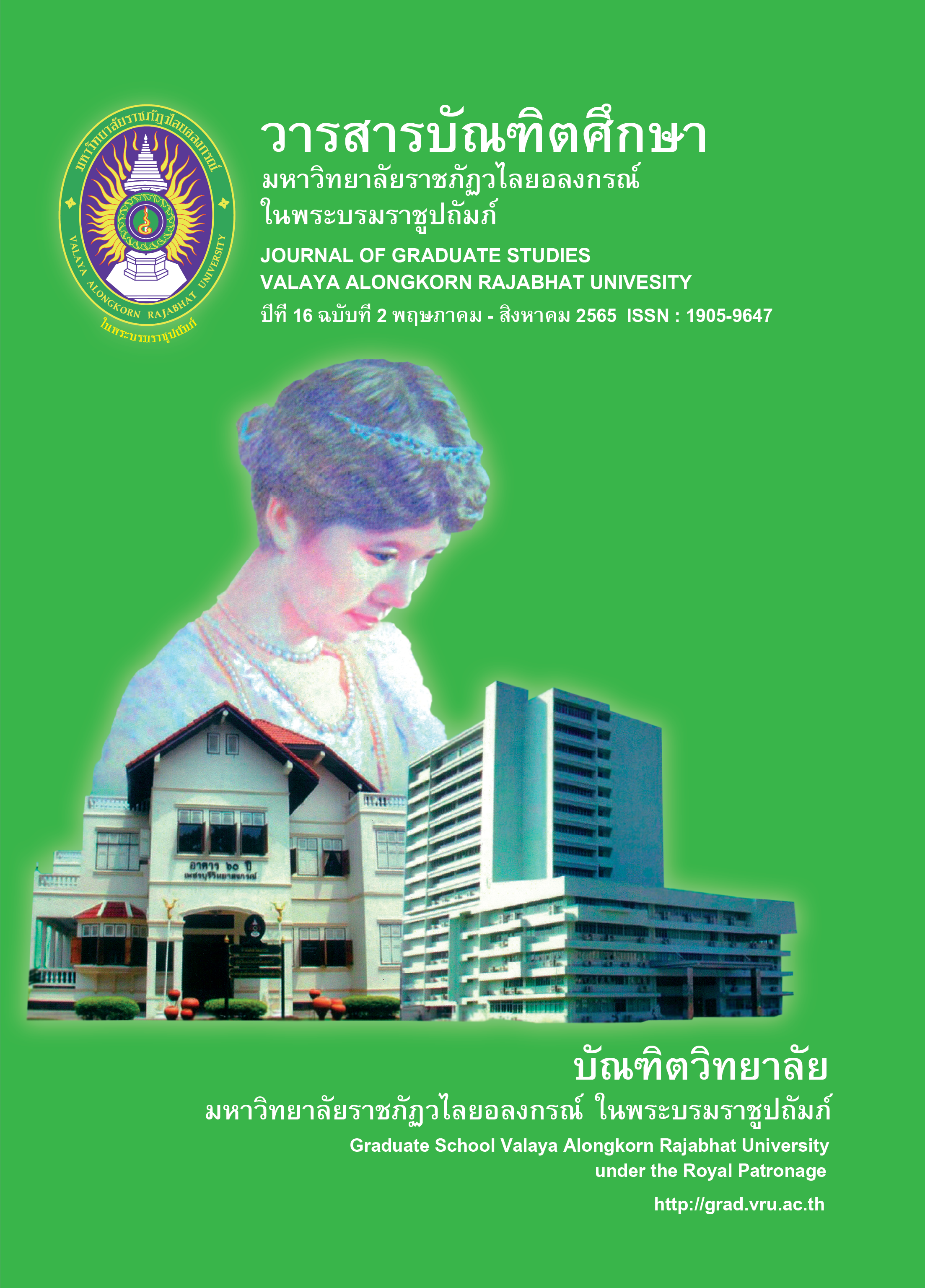INQUIRY-BASED LEARNING MANAGEMENT TOGETHER WITH USING SOCRATIC QUESTIONS ON SCIENTIFIC CONCEPT AND INTEGRATED SCIENCE PROCESS SKILLS OF GRADE 10 STUDENTS IN PATHUM THANI EDUCATIONAL SERVICE AREA
Main Article Content
Abstract
The purposes of this research were to 1) to compare scientific concept between before and after learning by Inquiry-based learning management together with Socratic questions, 2) to compare integrated science process skills between before and after learning by Inquiry-based learning management together with Socratic questions,
3) to study gain score of scientific concept between before and after learning by Inquiry-based learning management together with Socratic questions 4) to study gain score of integrated science process skills between before and after learning by Inquiry-based learning management together with Socratic questions. Samples were 34 students who study in grade 10, Pathum Thani Primary Educational Service Area 2, randomly selected by random sampling. Research instruments were 1) lesson plan which focus on inquiry-based learning management together with Socratic questions 2) scientific concept test which validity between 0.67-1.00, reliability at 0.74, difficulty index between 0.53-0.77 and discrimination index between 0.20-0.60 3) integrated science process skills test with validity between 0.67-1.00, reliability at 0.86, difficulty index between 0.45-0.78 and discrimination index between 0.22-0.60. The collected data were analyze by using means, standard deviation, t-test, and gain score analysis.
The research findings were as follow; 1) Students who learned by Inquiry-based learning management together with Socratic questions had posttest means score of scientific concept higher than pretest means score significantly at the .05 level.
2) Students who learned by Inquiry-based learning management together with Socratic questions had posttest means score of integrated science process skills higher than pretest means score significantly at the .05 level. 3) All students had a higher gain scores of scientific concept; 8.82 percent of all students had gain sore at high level, 38.23 percent of all students had gain sore at moderate level, and 52.94 percent of all students had gain sore at basic level 4) All students had a higher gain scores of integrated science process skills; 2.94 percent of all students had gain sore at highest level, 17.64 percent of all students had gain sore at high level, 52.94 percent of all students had gain sore at moderate level, and 26.47 percent of all students had gain sore at basic level.
Article Details

This work is licensed under a Creative Commons Attribution-NonCommercial-NoDerivatives 4.0 International License.
บทความทุกเรื่องได้รับการตรวจความถูกต้องทางวิชาการโดยผู้ทรงคุณวุฒิ ทรรศนะและข้อคิดเห็นในบทความ Journal of Global of Perspectives in Humanities and Social Sciences (J-GPHSS) มิใช่เป็นทรรศนะและความคิดของผู้จัดทำจึงมิใช่ความรับผิดชอบของบัณฑิตวิทยาลัย มหาวิทยาลัยราชภัฏวไลยอลงกรณ์ ในพระบรมราชูปถัมภ์ กองบรรณาธิการไม่สงวนสิทธิ์การคัดลอก แต่ให้อ้างอิงแหล่งที่มา
References
Boonlerd, S. (2012). phonkānchai rūpbǣp kān rīan kānsō̜n hā E rūam kap konlawithī kān sathō̜n ʻaphi panyā thī mī tō̜ phon samrit thāngkān rīan manō mati thāng witthayāsāt læ ʻaphi panyā khō̜ng nakrīan [The Effect of 5E Instructional Model with Metacognitive Reflection Strategies on Science Learning Achievement Science Concepts and Metacognition of Upper Secondary School Students]. Master’s thesis in Education Degree in Curriculum and Instruction, Thaksin University.
Haslam, F. & Tregust, D. F. (1987). Diagnosing secondary student misconceptions of photosynthesis and respiration in plant using a two-tier multiple choice instrument. Retrieved from https://www.researchgate.net/publication/234647942_Diagnosing_Secondary_Students'_Misconceptions_of_Photosynthesis_and_Respiration_in_Plants_Using_a_Two-Tier_Multiple_Choice_Instrument
Jaitueng, A. (2003). lakkān sō̜n (chabap prapprung) [Principle of Teaching (Revise Edition)]. Bangkok: Odeon Store.
Kanjanawasri, S. (2013). thritsadī kānthotsō̜p bǣp dangdœ̄m [Classical Testing Theory]. Bangkok: Chulalongkorn Printing House.
Ministry of Education. (2009). saphāwakān kānsưksā Thai nai wēthī lōk Phō̜.Sō̜. sō̜ngphanhārō̜ihāsip [Thailand Educational Situation in the World Stage 2007]. Bangkok: Prigwan Graphic.
Onyon, N. (2013). kānčhatkān rīanrū dūai rūpbǣp kānsō̜n dūai kān tōyǣng rūam kap kham thām sō khēntik phư̄a phatthanākān khit yāng mī wičhāranayān [Learning Management with Argument-Driven Instruction Model along with Socratic Questions for Developing Critical Thinking]. Journal of Research and Curriculum Development. 3(2), 21-32.
Paul, R. & Elder, L. (2001). Critical Thinking: Tool for Taking Charge of Your Learning and Your Life. New Jersey: Prentice Hall.
Prachanant, B. (2018). rūpbǣp kānrīanrū bǣp sư̄pso̜ hākhwām rū dōi konlawithī thāng ʻaphi panyā phư̄a songsœ̄m samatthana thāng witthayāsāt thaksa krabūankān thāng witthayāsāt læ kānraprū khwāmsāmāt thāng witthayāsāt khō̜ng nakrīan chan matthayommasưksā pī thī nưng [The Metacognitive Strategy Embedded in Inquiry Learning Model to Enhance Science Competencies, Science Process Skills and Self-efficacy in Science of Seventh Grade Students]. Dissertation in Science Education. Bangkok: Graduate School, Srinakharinwirot University.
Sanitboon, S. (2016). phonkān čhatkān rīanrū bǣp sư̄pso̜ hākhwām rū hā khan (hā E) rūam kap kānchai kham thām chœ̄ng wikhro̜ thī mī tō̜ manōthat læ kān khit wikhro̜ thāng witthayāsāt khō̜ng nakrīan chan matthayommasưksā pī thī hok rư̄ang fisik ʻatō̜m [The Effect of 5E Inquiry Approach and Analytical Questions of Grade 12 Students on Science Concepts and Scientific Analytical Thinking on Atomic Physics]. Master’s thesis in Education Degree in Science Teaching, Burapa University.
The Institute of the Promotion of Teaching Science and Technology. (2017). tūa chī wat læ sāra kānrīanrū kǣn klāng klum sāra kānrīanrū witthayāsāt (chabap prapprung Phō̜.Sō̜. 2560) [Indicator and Core Learning Content of Science Learning Area (Revise edition A.D.2017)]. Bangkok: Agricultural Cooperative of Thailand Printing House Limited.
The National Institute of Educational Testing Service. (2019). sathiti O - NET yō̜nlang [Previous O-NET Statistics]. Retrieved from https://www.niets.or.th/th/
Watnad, M. (2016). kānprīapthīap phon samrit thāngkān rīan læ thaksa krabūankān thāng witthayāsāt khan būranākān rư̄ang rabop prasāt khō̜ng nakrīan chan matthayommasưksā pī thī sī dōi kānčhatkān rīanrū bǣp sư̄pso̜ hākhwām rūrō̜wō̜ bō̜kānchai phǣnphang rūp tūa wī læ kānčhatkān rīanrū bǣp pakati [Comparison of Inquiry-based Learning with Vee Diagram and Conventional Approach on Learning Achievement and Integrated Science Process Skill in Topic of Nervous System of Grade 10 Students]. Master’s thesis in Science Degree in Biology Education, Burapa University.


